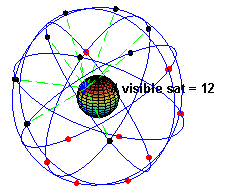 |
| GPS Satellite Simulation - Wikipedia |
Today I read an article about Tim Smith, the CIO of AccuWeather.com (I use this today instead of weather.com because its much simpler and less full of useless ads - though recently they've added some of their own useless ads).
At any rate what was interesting was that AccuWeather, like others I am sure, provide weather services for personal electronics - phones, iPads, and so on. In order to do this the on-board GPS of the device is queried for the location information.
GPS provides location information in 3-space - that is - three dimensions - X, Y, and Z - or for the less mathematically astute left/right, front/back, up/down. (If you're lost here skip the next sections.)
To do this the GPS system relies on a number of satellites orbiting the earth. A GPS receiver requires information from at least four of these satellites. The satellites all have a known location. Each satellite transmits a clock value that contains a "time stamp" indicating when the value was sent.
Knowing the speed of light and the location of the satellite (they rotate the earth twice each sidereal day) the receiver can receive these values and calculate a distance to the satellite. Using this distance the receiver can create a sphere around each satellite. The GPS receiver is located at the intersection of these spheres. (There are more technical details and complexity but I am glossing over them for brevity here.)
Now the accuracy of the GPS system involves number to between 10 and 15 decimal places (orders of magnitude), e.g., numbers like 12.76589043245 which resolve your position down to a meter or less.
Places like AccuWeather require your position when sending your phone a forecast.
AccuWeather received about 100 million requests per day for weather information (often using GPS data) in 2010. By 2011 they were receiving upwards of 750 million per day. Simth, the CIO, noticed that many of the requests being made used the full 10 or 15 digits of location information. Since weather prediction does not accurately predict differences in weather at the distance of a meter or less it seemed foolish to process these requests separately.
So Smith made a simple change to his systems to allow the requests to be truncated to two decimal positions - which reduces the accuracy to about a kilometer. The AccuWeather can then cache requests (which means that the weather for exactly the same GPS coordinates result in a precomputed result being sent rather than recomputing it each time) saving them hundreds of millions of queries.
Now, imagine how much waste is really going on in entire the IT world each day. First of all, its really hard to imagine 750 million weather requests per day. That's like every human being in North America requesting the weather twice a day. Since most people live in groups and many live within a given kilometer there really would be a lot of waste in involved - waste in computing, network traffic, time, etc. And that's just to collect information from one web site.
And this is just to get an approximation of what the weather is outside - where you could look yourself.
The only real use for me of all this is, as I mentioned in the original article, prediction of rain for my daily run (involving one quick scan of the radar map) and, as a musician, when to run for cover when playing outside and a storm approaches (usually the big red/purple blobs heading your way are proceeded by lightening and thunder). The rest of the time I look out the window.
While I can image a lot of other business reasons to use these types of sites the relatively poor accuracy really doesn't make it worth while. For example, I certainly would not pour concrete based on these sites.
So why do people need so much relatively inaccurate weather data?
Its hard to say - laziness I suppose - to busy looking at the TV/Video/Game/Computer to look out the window.
Automation - a lot of background apps chew up resources updating some background weather map.
Its really hard to imagine.
And then there is the "waste energy" our global warming friends are so concerned about.
It seems kind of ironic that weather servers are spewing out CO2 (via wasted power for wasted queries by devices no one is looking at) about inaccurate weather predictions people could have just as easily gotten by looking out the window in the first place.
No comments:
Post a Comment